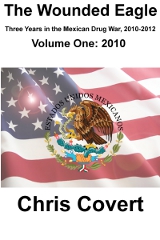Mexican Officials Mull Court Decision

2011-07-14
Posted by: badanov
By Chris Covert
Even though mainstream Mexican leftist publications are crowing happily about Tuesday's Supreme Court decision concerning rules for the Mexican military have left Mexican government officials and journalists silent about the ruling's potential impact.
Tuesday the Mexican Supreme Court ruled that civilian courts can try soldiers suspected of crimes against civilians in civilian courts, reversing an opinion issued two months ago which permitted Mexican military to investigate charge and try military personnel under military law. The provision in the Code of Military Justice, Article 57, states that military personnel can only be investigated, charged and tried in military courts for crimes committed against civilians in security operations. Under the May ruling, which was attached to a new national security law currently in limbo, nothing changed.
With the new decision that guts Article 57, the Mexican Supreme Court has not only removed all 18 rifle battalions recently formed to deal with organized crime from drug cartel situation rooms, it has left a security apparatus with no alternatives in dealing with the pervasive organized crime problem in Mexico.
Late Tuesday a joint communique was released from the Mexican Army (SEDENA), Marines (SEMAR) the Ministry of the Interior (SEGOB) which stated in rather lame terms their intention to abide by the new ruling. English language press said the press released stopped short of saying the Mexican military will turn over all current such cases to civilian courts.
On Wednesday, Mexican Army head of the Direccion General de Derechos Humanos (Human rights Directorate) Colonel de Justicia Militar Anibal Trujulllo Sanchez called the decision one which favors the drug cartels.
In an APRO wire service report, Colonel Trujulllo Sanchez said that since 2006, of more than 6,000 human right cases filed against the Mexican Army alone, 86 were found to have some foundation and were either disposed of through Mexican military justice system or were in process. The remainder, she said, were likely filed by individuals sympathetic to or in the pay of organized crime.
The colonel said the new venues and processes opened up by Tuesday's decision, which now permits human rights cases against the Mexican military to be filed at all three levels to be in conformance with international human right conventions, is an additional and unnecessary stress for the military.
It is why military personnel should not be subject to civilian courts.
Universidad Anahuac professor of law Federico Ponce Rojas said in an article published in Milenio Wednesday the new ruling is inconsistent with the Mexican constitution.
The underpinnings of the decision,conformance to international human rights treaties is the problem.
"...treaties must conform to the Constitution and the Constitution to treaties," he is quoted as saying.
In fact the only Mexican politician to come out in favor of the ruling has been Partido Revolucionario Institutional (PRI) federal deputy Hector Guevara, who said the main fucntion of the Mexican miltary should be national security, not fighting crime.
He said the new strategy imposed by the new ruling means the Mexican military now must be moved to the barracks and concentrate on national security work, not on fighting crime.
Where the new ruling leaves the natonal security law is anyone's guess. Over the weekend, it was announced that any new work to be performed on the new law, now in limbo in favor of other issues, will be delayed to August.
The new decision affects only part of the new law. Substantial charges were proposed in the law such as giving the president the power without consulting congress to imposed martial law in specific municipalities as part of counternarcotics operations, under the advice of army and subordinate field commanders. The new ruling potentially complicates the aftermath of martial law and leave uncertain how martial law in specific municipalities would affect humans rights cases filed after martial law is lifted.



